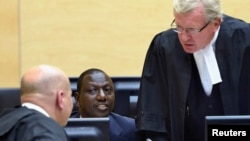THE HAGUE —
Kenya's deputy president, William Ruto, promised the International Criminal Court on Tuesday he and the president would cooperate despite calling their charges over election violence the result of a “conspiracy of lies''.
Ruto was attending a pre-trial hearing in The Hague, where he and President Uhuru Kenyatta face charges of orchestrating clashes in which some 1,200 people were killed five years ago after a presidential election.
“The new Kenyan administration ... will cooperate with the court, because President Kenyatta and myself believe in the rule of law,'' he said at the end of the two-hour hearing, at which his lawyers asked permission for him to appear in future via video link to allow him to carry out his official duties.
Wearing a blue suit and a maroon tie, Ruto looked at ease throughout the hearing, chatting and smiling with his lawyers.
Kenyatta and his running mate Ruto won this year's largely peaceful presidential election, leaving the court case as a complication in the West's relations with Kenya, an ally in the fight against Islamist militancy in the region.
Analysts said the ICC charges boosted their poll performance in a country where sensitivities about post-colonial interference run deep.
Prosecution and defense lawyers repeatedly clashed over the question of whether the prosecution should be allowed to introduce new witnesses to bolster its case against Ruto and his co-accused, the broadcaster Joshua arap Sang.
Ruto dismissed the evidence against him, saying that he was the “victim ... of a syndicate of falsehood and a conspiracy of lies choreographed by networks which are obviously against truth and justice''.
Prosecutors have struggled to pin charges on suspects in several other countries' cases they have examined, with judges repeatedly criticizing them for failing to line up convincing witnesses.
In March, prosecutors dropped charges against Francis Muthaura, Kenyatta's co-accused, saying witnesses had been intimidated into withdrawing their testimony.
There were tense scenes in the courtroom as Ruto's lawyer, Karim Khan, attempted to list witnesses whose testimony he said was of little value, before being interrupted by prosecution lawyers who accused him of placing witnesses in jeopardy by reading out confidential material in open court.
Prosecutors said allowing Ruto to attend by video link would do a disservice to the victims of the violence.
“Witnesses need to be reassured that there are people listening to their testimony, not just your honors but also the parties who are present. The victims need confidence in the system, to be heard,'' said Cynthia Tai, a prosecution lawyer.
Judges will rule on the requests at a later date. They have yet to set a date for the start of the trial.
Ruto was attending a pre-trial hearing in The Hague, where he and President Uhuru Kenyatta face charges of orchestrating clashes in which some 1,200 people were killed five years ago after a presidential election.
“The new Kenyan administration ... will cooperate with the court, because President Kenyatta and myself believe in the rule of law,'' he said at the end of the two-hour hearing, at which his lawyers asked permission for him to appear in future via video link to allow him to carry out his official duties.
Wearing a blue suit and a maroon tie, Ruto looked at ease throughout the hearing, chatting and smiling with his lawyers.
Kenyatta and his running mate Ruto won this year's largely peaceful presidential election, leaving the court case as a complication in the West's relations with Kenya, an ally in the fight against Islamist militancy in the region.
Analysts said the ICC charges boosted their poll performance in a country where sensitivities about post-colonial interference run deep.
Prosecution and defense lawyers repeatedly clashed over the question of whether the prosecution should be allowed to introduce new witnesses to bolster its case against Ruto and his co-accused, the broadcaster Joshua arap Sang.
Ruto dismissed the evidence against him, saying that he was the “victim ... of a syndicate of falsehood and a conspiracy of lies choreographed by networks which are obviously against truth and justice''.
Prosecutors have struggled to pin charges on suspects in several other countries' cases they have examined, with judges repeatedly criticizing them for failing to line up convincing witnesses.
In March, prosecutors dropped charges against Francis Muthaura, Kenyatta's co-accused, saying witnesses had been intimidated into withdrawing their testimony.
There were tense scenes in the courtroom as Ruto's lawyer, Karim Khan, attempted to list witnesses whose testimony he said was of little value, before being interrupted by prosecution lawyers who accused him of placing witnesses in jeopardy by reading out confidential material in open court.
Prosecutors said allowing Ruto to attend by video link would do a disservice to the victims of the violence.
“Witnesses need to be reassured that there are people listening to their testimony, not just your honors but also the parties who are present. The victims need confidence in the system, to be heard,'' said Cynthia Tai, a prosecution lawyer.
Judges will rule on the requests at a later date. They have yet to set a date for the start of the trial.





